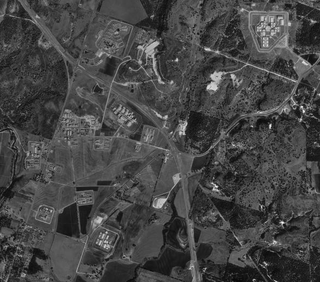
Bronte is a town in Coke County, Texas, United States. The population was 999 at the 2010 census.

Gatesville is a city in and the county seat of Coryell County, Texas, United States. Its population was 16,135 at the 2020 census. The city has five of the nine prisons and state jails for women operated by the Texas Department of Criminal Justice. One of the facilities, the Mountain View Unit, has the state's death row for women.

In criminal justice systems, a youth detention center, known as a juvenile detention center (JDC), juvenile detention, juvenile jail, juvenile hall, or more colloquially as juvie/juvy, also sometimes referred as observation home or remand home is a prison for people under the age of majority, to which they have been sentenced and committed for a period of time, or detained on a short-term basis while awaiting trial or placement in a long-term care program. Juveniles go through a separate court system, the juvenile court, which sentences or commits juveniles to a certain program or facility.

The American juvenile justice system is the primary system used to handle minors who are convicted of criminal offenses. The system is composed of a federal and many separate state, territorial, and local jurisdictions, with states and the federal government sharing sovereign police power under the common authority of the United States Constitution. The juvenile justice system intervenes in delinquent behavior through police, court, and correctional involvement, with the goal of rehabilitation. Youth and their guardians can face a variety of consequences including probation, community service, youth court, youth incarceration and alternative schooling. The juvenile justice system, similar to the adult system, operates from a belief that intervening early in delinquent behavior will deter adolescents from engaging in criminal behavior as adults.

Mountain View Unit is a Texas Department of Criminal Justice prison housing female offenders in Gatesville, Texas. The unit, with about 97 acres (39 ha) of land, is located 4 miles (6.4 km) north of central Gatesville on Farm to Market Road 215. The prison is located in a 45-minute driving distance from Waco. In addition to its other functions, Mountain View Unit houses the state's female death row inmates.
Juvenile delinquency in the United States refers to crimes committed by children or young people, particularly those under the age of eighteen.

The Texas Youth Commission (TYC) was a Texas state agency which operated juvenile corrections facilities in the state. The commission was headquartered in the Brown-Heatly Building in Austin. As of 2007, it was the second largest juvenile corrections agency in the United States, after the Florida Department of Juvenile Justice. As of December 1, 2011, the agency was replaced by the Texas Juvenile Justice Department.
The Pennsylvania Department of Human Services is a cabinet-level state agency in Pennsylvania. The Pennsylvania Department of Human Services' seven program offices administer services that provide care and support to Pennsylvania's most vulnerable citizens. These services include eligibility and benefits determination, foster care, juvenile justice, early childhood development, services for persons with developmental disabilities, autism services, long-term living programs, management of state psychiatric hospitals, and management of the Medical Assistance physical and behavioral health care programs. The Department consists of executive offices and seven program offices that include:

The United States incarcerates more of its youth than any other country in the world through the juvenile courts and the adult criminal justice system, which reflects the larger trends in incarceration practices in the United States. In 2010, approximately 70,800 juveniles were incarcerated in youth detention facilities alone. As of 2006, approximately 500,000 youth were brought to detention centers in a given year. This data does not reflect juveniles tried as adults. As of 2013, around 40% were incarcerated in privatized, for-profit facilities.

The Christina Melton Crain Unit is a Texas Department of Criminal Justice prison for females in Gatesville, Texas. The prison is along Texas State Highway 36, 3 miles (4.8 km) north of central Gatesville. The unit, with about 1,317 acres (533 ha) of space, is co-located with the Hilltop Unit, the Dr. Lane Murray Unit, and the Linda Woodman Unit. Nearby also is the Mountain View Unit, which houses all Texas female inmates on death row. Crain Unit's regular program houses around 1,500 women, and it is one of Texas's main prisons for women. Female prison offenders of the TDCJ are released from this unit. With a capacity of 2,013 inmates, Crain is the TDCJ's largest female prison.
The West Texas State School was a juvenile detention facility operated by the Texas Youth Commission that closed on August 31, 2010. It was located in unincorporated central Ward County, Texas, along the southwestern edge of Pyote, on Interstate 20 between El Paso and Midland. The former school was about 17 miles (27 km) west of Monahans, 50 miles (80 km) west of Midland and Odessa, and 230 miles east of El Paso.

The Gatesville State School for Boys was a juvenile corrections facility in Gatesville, Texas. The 900-acre (360 ha) facility was converted into two prisons for adults, the Christina Crain Unit, and the Hilltop Unit.

The Hilltop Unit is a Texas Department of Criminal Justice prison for women located in Gatesville, Texas. Originally opened in September of 1981 as a Male first offender Unit, it is headed by Warden Jerry Gunnels. Hackberry School was the first opened then in October Sycamore was opened and housed SAT IV Construction inmates who were working on Gatesville Unit and Hilltop repairing and buildings and facilities. Until May 1982, when the Hilltop Unit proper was opened.
The Gainesville State School is a juvenile correctional facility of the Texas Juvenile Justice Department in unincorporated Cooke County, Texas, near Gainesville. The fenced, maximum security state school is located on a 160-acre (65 ha) tract east of Gainesville, 75 miles (121 km) north of Dallas, along Farm to Market Road 678 and near Interstate 35. Gainesville is a maximum security facility and is fenced. As of 2012 it is the largest juvenile correctional facility in Texas. As of 2012 it houses 270 teenagers. Many of them are 17 and 18 years old.
The Crockett State School (CSS) was a Texas Youth Commission juvenile correctional facility in Crockett, Texas. The students at the state school had committed various crimes, including truancy, property crimes and crimes against persons. The Crockett State School, located on what was a 125-acre (51 ha) farm, is about 115 miles (185 km) north of Houston.

Giddings State School is a juvenile correctional facility of the Texas Juvenile Justice Department located in unincorporated Lee County, Texas, near Giddings. In 2004, the state school was Lee County's largest employer.

The Connecticut Department of Children and Families (DCF) is a state agency of Connecticut providing family services. Its headquarters is in Hartford.

A prison cemetery is a graveyard reserved for the dead bodies of prisoners. Generally, the remains of inmates who are not claimed by family or friends are interred in prison cemeteries and include convicts executed for capital crimes.
Gulf Coast Trades Center / Raven School (GCTC) is a charter boarding school located in unincorporated Walker County, Texas, near New Waverly. The school, operated by the nonprofit agency Gulf Coast Trades Center Inc., is in proximity to Houston.
The Texas Juvenile Justice Department (TJJD) is a state agency in Texas, headquartered in the Braker H Complex in Austin.












